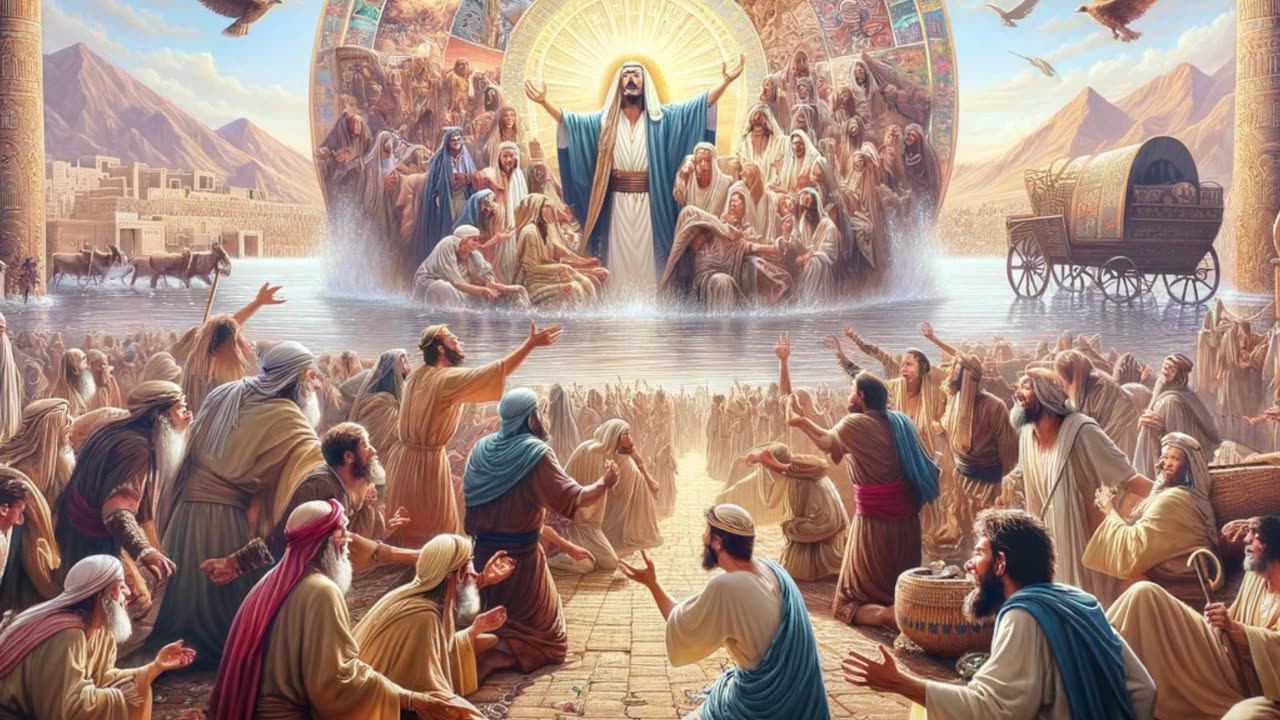Premium Only Content

Genesis 45 Divine Recognition and Forgiveness:
Food for Thought Description
In the poignant narrative of Genesis 45, Yosef reveals himself to his brothers who had sold him into slavery, a moment of profound recognition and forgiveness. This scene echoes in the New Testament when Yahusha, not initially recognized as the Messiah, was finally understood by His disciples in the breaking of bread after His resurrection (Luke 24:30-31). Similarly, Yosef's forgiveness of his brothers prefigures Yahusha’s teachings on the necessity of limitless forgiveness, as He instructs Kepha (Peter) to forgive "seventy times seven times" (Matthew 18:21-22), emphasizing the boundless nature of divine forgiveness.
Preservation and Providence Through Trials:
The biblical theme of preserving a remnant through adversity is vividly portrayed in the stories of Noach and the great flood and the later exiles of Israel and Yahudah. Despite judgment, a remnant is always preserved, which Yeshayahu (Isaiah) 10:20-22 highlights as a return to the mighty Alahim. This theme is also encapsulated in Yosef’s life, where seven years of plenty followed by seven years of famine demonstrate Yahuah’s providential care. Yosef’s divinely inspired strategy not only anticipates the hardships but also ensures Mitsrayim's (Egypt's) survival, symbolizing both preparation and providence.
The Symbolic Completeness of the Number 7:
Central to Yosef's story and Biblical creation, the number 7 symbolizes completeness and divine orchestration. In Bereshith (Genesis) 1, Yahuah's creation of the world in six days, culminating in a seventh day of rest, establishes a pattern of completion and sanctity that resonates through scriptural narratives. The seven-year cycle in Yosef’s era underlines that survival and reunion sometimes require enduring a complete cycle of hardship, as seen when Ya'akov (Jacob) moves to Mitsrayim to be with Yosef, ensuring his family's survival through the remaining five years of famine.
Insightful Reflection:
The decision of Ya'akov to move his family to Mitsrayim, driven by the continuation of the famine, underscores the theme that Yahuah’s plans often require enduring through a complete cycle of challenges for fulfillment. Had the famine been shorter, Ya'akov might have remained in Kena'an (Canaan), altering the course of biblical history and the essential lessons we draw from these narratives.
-
 9:52
9:52
MattMorseTV
12 hours ago $10.93 earnedTrump just GAVE the ORDER.
10.7K43 -
 19:19
19:19
GritsGG
14 hours agoINSANE Trio Match! Most Winning Warzone Player IGLs to Victory!
4.87K1 -
 32:24
32:24
Forrest Galante
1 day agoHunting and Eating The World's WORST Fish (Everglades At Night)
124K8 -
 11:37
11:37
The Pascal Show
1 day ago $13.48 earnedTHEY WANT TO END HER?! Candace Owens Claims French President & First Lady Put A H*t Out On Her?!
44K46 -
 LIVE
LIVE
Lofi Girl
3 years agolofi hip hop radio 📚 - beats to relax/study to
188 watching -
 35:40
35:40
The Why Files
5 days agoPsyops: From Dead Babies to UFOs - The Same Pattern Every Time
109K105 -
 1:48:26
1:48:26
Tucker Carlson
2 days agoKristen Breitweiser: 9-11 Cover-Ups, Building 7, and the Billion-Dollar Scam to Steal From Victims
181K419 -
 5:48
5:48
Russell Brand
2 days agoThey BURNED me in effigy!
68.2K41 -
 1:21:40
1:21:40
Man in America
9 hours agoThe Secret AI Plan to Enslave Humanity — And Why It Will FAIL w/ Todd Callender
52.5K22 -
 2:18:17
2:18:17
TheSaltyCracker
9 hours agoTreason Season ReeEEStream 11-23-25
162K259